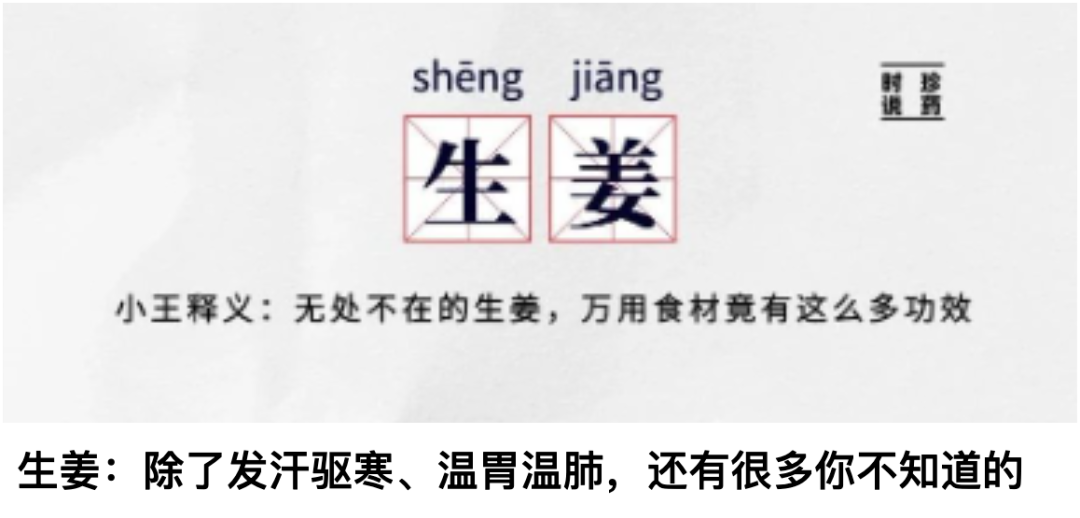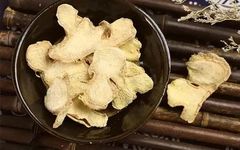Love Life, Love Research, Love Sharing
I am Wang Shizhen
“Shizhen Talks about Medicine” is being updatedMedicine and food share the same source; more research leads to better understanding and knowledge.May every family have a little health expert for adjustment.
Hello everyone, I am Wang Shizhen, who loves research.
Ginger has been a cooking ingredient on Chinese tables for thousands of years.
The ginger we commonly see can mainly be divided into dried ginger and fresh ginger.
Previously, Xiao Wang introduced the medicinal effects of fresh ginger; today, let’s talk about 「Dried Ginger」.
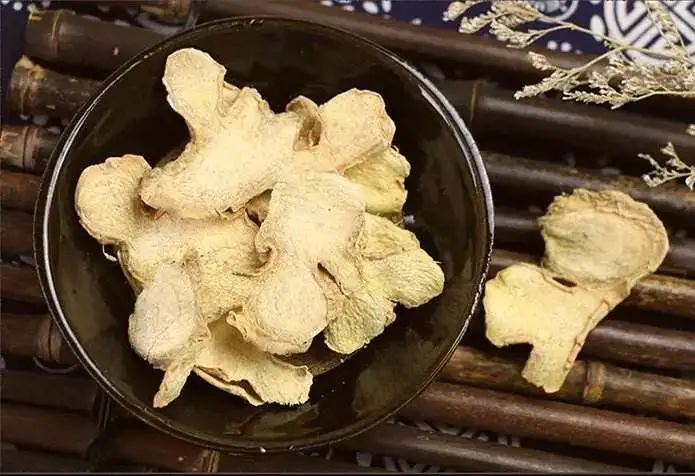
Image source: Internet
There is an old saying in China: “Old ginger is spicier”, referring to dried ginger.
Dried ginger and fresh ginger have many differences. Dried ginger has a yellowish-brown appearance, with a rougher skin compared to fresh ginger, deeper surface lines, a spicier taste, and feels drier when broken apart, with denser flesh and more fibers, and a stronger aroma.
In contrast, fresh ginger has a smoother skin, a milder spicy taste, softer flesh, more moisture, and less fiber, with a whitish color.
However, both dried ginger and fresh ginger can be used medicinally.
“
Dried ginger is pungent, warm in nature, and enters the Spleen, Stomach, Kidney, Heart, and Lung meridians. It has the effects of warming the middle, dispersing cold, restoring yang, unblocking the meridians, and warming the lungs to transform phlegm. It is indicated for cold pain in the abdomen, vomiting, diarrhea, cold limbs with weak pulse, and cough with cold phlegm.
——《Shennong’s Classic of Materia Medica》
”
The Master of Dispelling Cold
Dried Ginger
Dried ginger is warm in nature; in TCM, warm herbs can dispel cold.
Dried ginger is the top herb for dispelling cold in traditional Chinese medicine.If you have cold energy in your body, consider using dried ginger for adjustment.
What are the manifestations of cold in the body?
1 |Cold in the Heart
You often hear friends joking, “My heart! It’s so cold!”
This may not be an exaggeration; there are indeed people with a cold heart, and such individuals can be quite frightening.
Normal people are optimistic, warm-hearted, and proactive. However, those with a cold heart often harbor dark thoughts, filled with negative emotions, and see the dark side of everything.
2 |Cold in the Lungs
People with cold in the lungs are prone to colds, coughs, and runny noses, especially in cold weather. When they catch a cold, they often have a clear runny nose and may produce foamy phlegm.
Such individuals often experience nasal congestion and symptoms of rhinitis.
Cold in the lungs can lead to respiratory issues, and the body will try to expel the cold energy.
3 |Cold in the Spleen and Stomach
People with cold in the spleen and stomach are like soil that is too cold; they cannot eat cold foods, as it will lead to diarrhea. They often experience abdominal pain, which feels better after a bowel movement.
When you touch their abdomen, it feels cold all around.
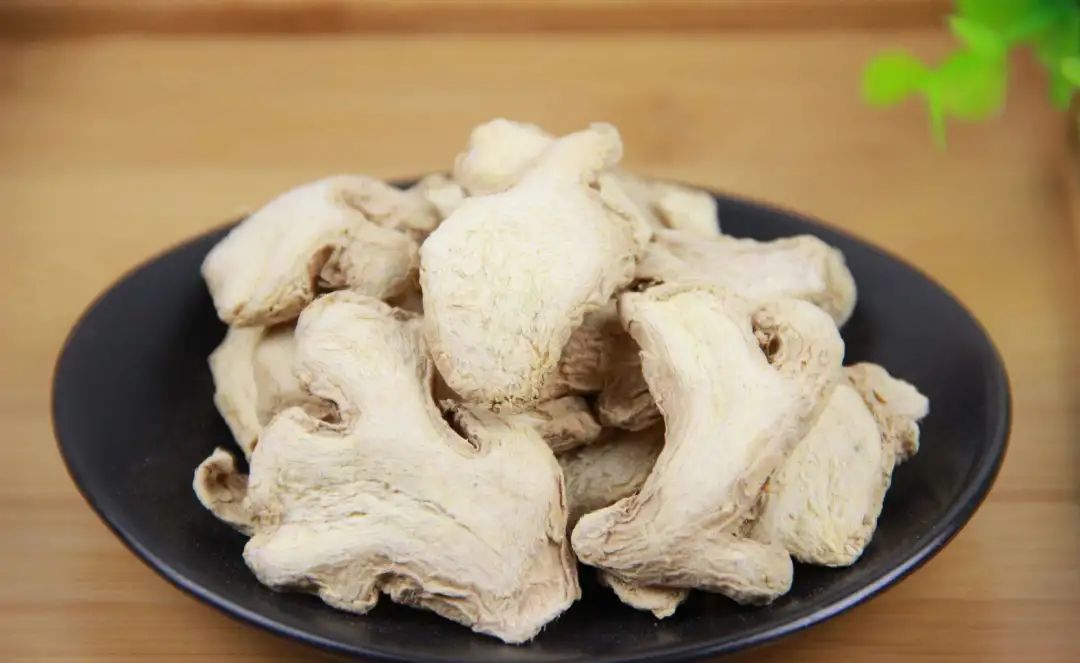
Image source:Internet
If you have the symptoms mentioned above, then dried ginger is definitely your best choice. If combined with Fu Zi (Aconite) or Xi Xin (Asarum), the power of dispelling cold will be even greater.
Besides Dispelling Cold
Dried Ginger also has the following effects
1 |Restoring Yang and Unblocking the Meridians
Dried ginger primarily enters the Heart, can invigorate the heart and restore yang energy, improving conditions of faint pulse and impending collapse.
Additionally, due to its pungent and warm nature, it can treat fainting caused by deficiency of Heart and Kidney yang with excess internal cold.
2 |Warming the Lungs and Transforming Phlegm
For stopping cough and transforming phlegm, dried ginger’s effect is similar to that of fresh ginger, but stronger.
Fresh ginger excels at stopping vomiting, while dried ginger excels at warming the lungs and transforming phlegm;Fresh ginger is used for wind-cold exterior syndrome, while dried ginger is used for cough and wheezing with cold body and abundant clear phlegm.
3 |Fresh Ginger Treats the Stomach, Dried Ginger Treats the Spleen
There is an old saying: “Fresh ginger treats the stomach, dried ginger treats the spleen.” In fact, both types of ginger can warm the middle and disperse cold; the so-called “warming the middle” refers to warming the spleen and stomach.
Many spleen and stomach diseases consider using ginger, but the type of ginger used varies according to the condition.
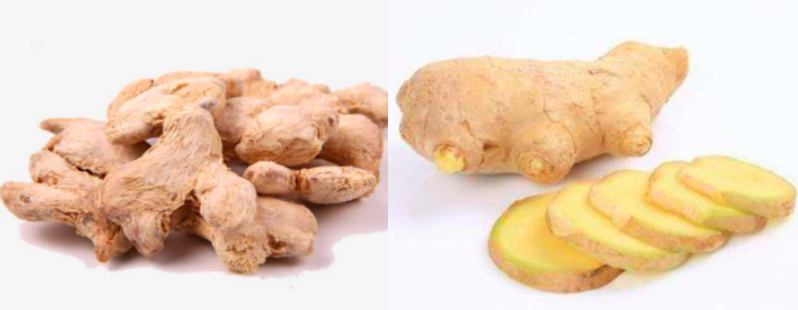
Left image: Dried Ginger, Right image: Fresh Ginger Image source:Internet
Because dried ginger has a richer and milder flavor, its medicinal properties can slowly penetrate the “interior,” that is, the internal organs, and then elevate the yang of the liver and spleen, making dried ginger suitable for treating spleen diseases.
In contrast, fresh ginger has a more dispersive flavor, entering the lungs and stomach, and its medicinal effects are more pronounced on the surface, which can expel turbid yin and reduce turbid energy in the bowels, making fresh ginger suitable for treating stomach diseases.
4 |Summer is the Best Time to Eat Dried Ginger
Everyone has heard the saying: “Eat radishes in winter and ginger in summer”.
Because summer is more humid, many people are affected by dampness, leading to symptoms like fatigue, insomnia, depression, and reduced speech. At this time, it is advisable to consume ginger for adjustment, and it is best to choose the milder dried ginger.
Some people consume rich tonics to boost their immunity, such as Gu Yuan Gao (a tonic paste), longan, and cooked rehmannia; at this time, it is best to pair them with some dried ginger to 「warm and transform」.
Office workers who often feel sleepy in summer can brew dried ginger slices with black tea; regularly drinking this ginger tea can invigorate and warm the stomach, which is also beneficial for adjusting sub-health conditions.
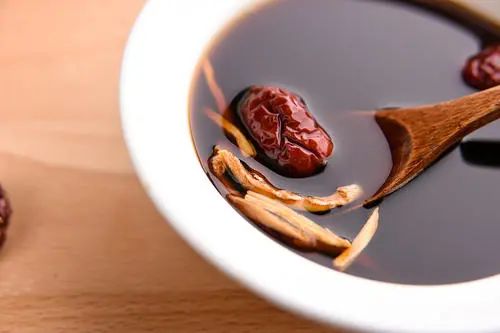
Image source:Internet
Since dried ginger is a very warming herb, those with internal heat, such as those with a red tongue who easily get heat symptoms from slightly spicy foods, should use dried ginger with caution.
That’s all for dried ginger; I hope everyone can recognize the differences between fresh ginger and dried ginger and choose the appropriate type of ginger for adjustment based on different symptoms.
References
【1】Li Shizhen, edited by Huang Zhijie and Hu Yongnian, “Compendium of Materia Medica”【2】Eastern Han Dynasty “Shennong’s Classic of Materia Medica”
「Previous Recommendations」
